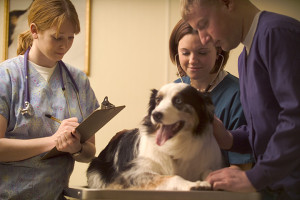According to Fatzò & al. (2006), when faced with behavior issues with Rex or Fido, most owners will first and above all, talk to their veterinarian during routine visits. Veterinarians are often the first pet professional to hear about the problems and in the best position to make recommendations, or refer their clients to someone who can help them. A survey conducted among veterinarians in the US, revealed that 42% considered they could address the behaviors concerns themselves and only half of them would consider referring cases to veterinarians behaviorists. A small minority will send them to dog trainers (Thomson Veterinary Healthcare Communications 2003).
When we decide to start a professional career with dogs, it’s because of our love for the animal and our desire to make a difference. With this career choice, also comes the difficult realization of the giant gap between the public’s knowledge of dogs and the reality, with its devastating consequences to millions of abandoned pets. Most dog parents still hold the belief that owning a dog is pretty straight forward, and carry common misconceptions about the animal’s behavior and needs, and many still don’t turn to professional trainers to help them.
In his study, Campbell (1986) found that 87% of dogs displayed more than one behavior problem, the most common ones being jumping on people (37%) and excessive barking (33%). A more recent study in the UK by Lindell (2002) revealed that, out of 502 households, 76% of dogs had shown aggressive behaviors, 70% inappropriate elimination, 57% pulled on the leash and 48% were excessively excitable. The Small Animal Clinic at the University of Pennsylvania also conducted an extensive study on behavior problems and reported a prevalence of the following problems: aggression issues (46%), inappropriate elimination (20%), destructive behaviors (16%), fear (9%) and excessive barking (5%) (Borchelt & Voith, 1996). Although these different studies reveal slightly different numbers, they all lead to the same conclusion: behavior problems are very common, so common, that they exist in most households where a dog lives.
The results of these surveys reveal that a disconnect lies between the enormity of the need and the professional help that dog parents will seek. On the one hand, owners may only find a need to talk about the issues at home once a year, leaving a lot of time for the problems to get worse. On the other hand, veterinarians seem to lack confidence in sending their clients to dog trainers or non-veterinarian behaviorists. They may not see the need for a referral and decide to help their clients themselves, but it’s also possible that they simply don’t have enough information about the trainers and behaviorists in their neighborhood to develop trust in their methods. Another startling fact is that most owners still do not seek direct help from local trainers, but will rather go to their veterinarian, even though most of them didn’t receive formal education on behavior issues.
In either case, as trainers and dog behaviorists, we need to make more effort to connect with the local veterinarians and understand where their reluctance to refer their clients comes from. When veterinarians do refer clients, it’s also important to keep the communication going and by sending them updates, and developing trust and coordinated team effort around behavior issues, especially when they have the potential to send animals to the pound. It also appears that more education of the public is still very needed so that working with dog professionals becomes a given when adopting a dog, instead of a last resort.
Jennifer Cattet, Ph.D.
Lindell L 2002 Control problems in dogs. In: Horwitz D, Mills D and Heath S (eds) BSAVA Manual of Canine and Feline Behavioural Medicine pp 69-79. British Small Animal Veterinary Association: Gloucester, UK
Thomson Veterinary Healthcare Communications 2003 The Veterinary Economics General Practitioner Ethics Study.Veterinary Economics, August: 16-19
Related articles
- 10 Signs Your Pet May Have Behavioral Issues (pawnation.com)
- My journey towards becoming a dog trainer & behaviorist… (smartanimal.staging.wpengine.com)





Really nice post! As a trainer, I am fortunate to have a wonderful vet clinic that refers very regularly to me. It is very hard to get veterinarians to refer to a trainer, but it is ultimately for their good. Referring to a qualified trainer will not only help their cients retain their pets longer so they can continue to seek medical care but MANY issues that a responsible, knowledgable trainer takes on requires further medical work ups that the veterinarian will need to perform. We could work together so nicely, how do we get the word out to the veterinarians? One large problem is that vets do not understand the difference between the many different certifications – some of which are hard to get and require constant continuing education others unfortunately are pretty much meaningless. A more persistent presence at Veterinary Conferences might be a good first step.
This is perfect. I will share with my clients!